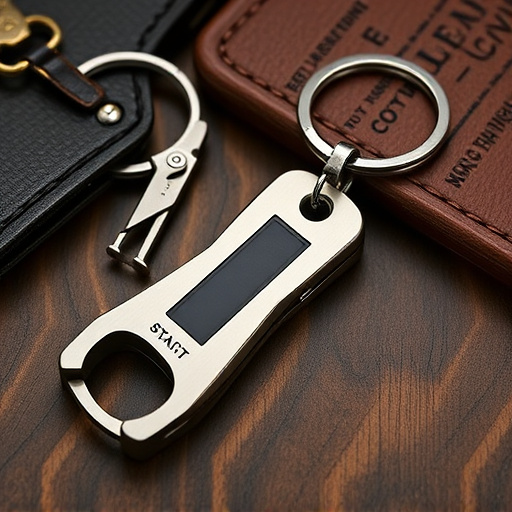In an era of unpredictability, individuals are prioritizing personal safety by understanding and adhering to Legal Self Defense Keychain Regulations. Each US state has unique rules governing these devices, from unrestricted carry to strict licensing requirements for pepper spray or stun keychains. Balancing individual rights and public safety, citizens must conduct thorough research on their state's specific laws to ensure compliance and protect their rights while using legal self-defense keychains responsibly.
“Uncovering the intricacies of legal self-defense keychain regulations is a crucial step towards empowering individuals to protect themselves. With varying state laws in the United States, understanding what constitutes a legal self-defense keychain and where it can be carried is essential. This comprehensive guide explores the differences in state regulations, clarifies the legal distinctions between self-defense tools and weapons, and provides insights into safe possession and responsible use. By delving into these key aspects, we aim to equip readers with knowledge about their rights and responsibilities regarding defensive keychain carry.”
- Understanding Self-Defense Rights and Legal Carry Guidelines
- – Overview of self-defense laws in the United States
- – Differing state regulations regarding self-defense keychains
- Keychain Weapons: What Qualifies as Legal?
Understanding Self-Defense Rights and Legal Carry Guidelines
In today’s world, individuals are increasingly recognizing the importance of being prepared for unexpected situations. This has led to a growing interest in legal self-defense keychain regulations and their role in personal safety. Understanding one’s rights regarding self-defense is a crucial step towards empowering oneself. It involves familiarizing with local laws and guidelines that govern the carry of defensive tools, such as keychains designed for self-protection. These legalities ensure citizens can exercise their right to defend themselves without crossing into areas that could lead to unintended consequences or false accusations.
Navigating the complexities of legal self-defense keychain regulations requires a thorough understanding of what constitutes reasonable force and when it’s appropriate to use such devices. Each state has its own set of rules, and staying informed about these guidelines is essential for responsible carry. By adhering to these laws, individuals can protect themselves while also respecting the rights and safety of others around them. This balance ensures that the right to self-defense remains a powerful tool for personal security without becoming a source of harm or legal repercussions.
– Overview of self-defense laws in the United States
In the United States, laws surrounding self-defense vary significantly from state to state, reflecting a complex interplay between individual rights and public safety concerns. Generally, citizens have the right to protect themselves against imminent harm, but the specifics of what constitutes reasonable force differ widely across jurisdictions. These variations are particularly notable when it comes to defensive keychain devices, which are compact tools designed for personal protection. Legal Self-Defense Keychain Regulations involve guidelines that dictate when and how such keychains can be legally carried and used.
States have enacted various laws and regulations to balance the need for citizens to protect themselves with the obligation to prevent excessive use of force. Some states allow the carrying of defensive keychains without a permit, while others require registration or even specific training certifications. These legal Self Defense Keychain Regulations also outline the permissible levels of force, typically defining what constitutes “reasonable suspicion” and “imminent danger.” Understanding these laws is crucial for individuals considering arming themselves with such devices to ensure they remain within the bounds of the law and protect their rights.
– Differing state regulations regarding self-defense keychains
The legal regulations surrounding self-defense keychains vary significantly from state to state in the US, creating a complex landscape for citizens seeking to protect themselves. While some states have relatively relaxed rules allowing open carry of self-defense tools, others enforce strict limitations. For instance, certain states permit the use of keychains with built-in pepper spray or stun devices without a permit, whereas other states require users to obtain special licensing or permits. These varying guidelines can be attributed to differing interpretations of self-defense laws and public safety concerns.
States with more lenient regulations often prioritize individual freedom and quick access to personal protection. In contrast, states with stricter rules tend to focus on controlling the availability of weapons, ensuring public safety, and potentially reducing the potential for misuse. As a result, those considering legal self-defense keychain carry should thoroughly research their state’s specific laws and understand the responsibilities that come with such a decision.
Keychain Weapons: What Qualifies as Legal?
When it comes to defensive keychains, understanding what qualifies as legal self-defense under state regulations is crucial. These small, often concealed devices can be a handy tool for personal safety, but their legality varies significantly across different states. In many places, keychain weapons are regulated under broader self-defense laws, which dictate their size, capacity, and materials used. For instance, some states permit only non-lethal options like pepper spray or tasers, while others allow more robust defensive tools.
The legal definition of a “self-defense keychain” typically refers to devices designed for immediate personal safety, often featuring features like sharp blades, spikes, or electroshock capabilities. It’s important to note that these items must adhere to specific guidelines regarding their functionality and carry limits. States may also have restrictions on who can legally possess such keychains, usually reserving them for individuals over a certain age or those with valid permits. Staying informed about your state’s regulations is essential to ensure compliance and make full use of legal self-defense keychain options.
In navigating the complex landscape of defensive keychain legal carry guidelines across various states in the U.S., it’s clear that understanding these regulations is paramount for responsible self-defense. Each state has its own set of rules governing what constitutes a legal self-defense keychain, highlighting the diverse approach to personal protection. As citizens exercise their right to bear essential tools for safety, staying informed about local laws ensures compliance and promotes public safety. Awareness of these guidelines empowers individuals to make informed decisions, ensuring they remain within the boundaries of the law while prioritizing their well-being.
